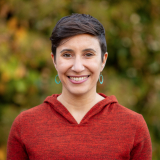The day before the deadly shooting at the Tree of Life synagogue, I drove an asylum seeker named D to an appointment in downtown Boston. “Where do Jewish people pray?” she asked me suddenly. D is from West Africa and has been living with my family while her asylum application is processed.
“Jewish people pray in synagogues,” I responded.
“Do you pray at a special time?” she continued.
I explained that some Jews go to synagogue on Shabbat—Friday night and Saturday morning—but many Jews pray whenever or wherever they want. It didn’t occur to me to share that a synagogue could be vulnerable to gun violence. So we quickly moved on to talking about other matters: our favorite music, the rules of baseball and why there is a chicken on the Kellogg’s Corn Flakes box.
When D moved in to our guest room, I hadn’t given much thought to how my own story intersects with hers. She was born in Africa. I was born in New Jersey. She is Muslim. I am Jewish. But I did think about the experience of helping and being helped. And that is what I’m sitting with now in the swirl of pain and outrage, heartbreak and despair.
The willingness to help refugees, immigrants and asylum seekers is exactly what the shooter in Pittsburgh hates about Jews. The willingness to help people living with HIV is precisely how Dr. Jerry Rabinowitz, one of the synagogue victims, defined his life’s work.
Help is what D, and other asylum seekers who come to the United States, are brave enough to request. And help is what my great-grandfather and his family sought in 1907 when they fled anti-Jewish pogroms in Russia for a better life in Philadelphia.
What does it mean to live in a country—a country built by immigrants—whose president denigrates helping, and the need for help, as a threat to power? What do we do when our elected officials view kindness and generosity as inferior to aggression and greed?
My 3-year-old has a book called “Be Kind” that we often read together before he goes to sleep. “What does it mean to be kind, anyway?” the book asks. The answers vary: Maybe it’s baking cookies for a man who lives alone. Or sticking up for a kid who is being bullied. Perhaps it’s carrying dirty dishes to the sink. Or teaching a friend something new.
It feels naïve, almost childish, to hold on to these seemingly small gestures of kindness when the horrors are so vast. Yet as we resist political oppression or direct our rage to build a better future, I worry that kindness is slipping away.
My rabbi taught me that the values of Emet (truth) and Chesed (loving kindness) are often connected, even twinned, in Jewish tradition. Acknowledging truth allows us to more fully embrace compassion. And acting with kindness opens up possibilities for deeper truths.
So I’m left wondering, what do we need to get through dark times? Certainly hope. Definitely courage. But I also think we need more kindness; kindness to give and kindness to receive.
The day after the shooting, I received a text from a neighbor. “Taking care of the world is hard,” she wrote. “Taking care of a neighbor might be a little easier. Want to start a monthly dinner swap?”
“Absolutely,” I answered.
The following morning, she texted again to ask if I had two spare eggs. “Be right over!” I texted back. An hour later, her daughter showed up on my doorstep with a plate of maple scones.
This post has been contributed by a third party. The opinions, facts and any media content are presented solely by the author, and JewishBoston assumes no responsibility for them. Want to add your voice to the conversation? Publish your own post here. MORE



